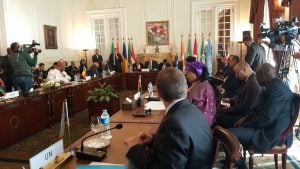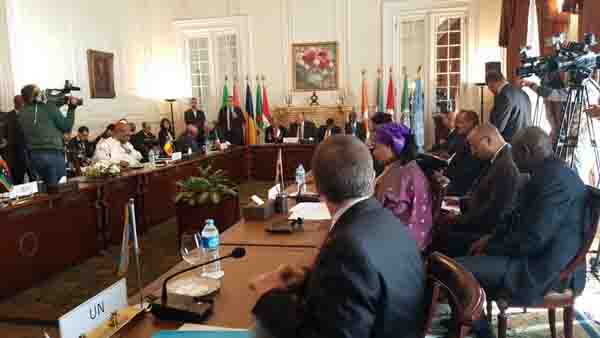By Libya Herald reporters.

Tunis, 21 January 2017:
There was strong support for continued international efforts to solve the Libyan crisis and for the Libyan Political Agreement (LPA) as the basis for doing so at a meeting today in Cairo of foreign ministers from Libya’s neighbouring states.
Three of the neighbours – Egypt, Algeria and Tunisia – have been pursuing their own attempts to promote reconciliation among the various Libyan groups and their ministers gave accounts of their efforts. However, the Algerian minister for Maghreb, African and Arab affairs, Abdelkader Messahel, pointed out that ultimately the solution to the Libyan crisis was in Libyan hands, not those of anyone else.
For his part, Egyptian Foreign Minister Sameh Shoukry noted that his country’s fundamental objective had not changed, which was to preserve the unity of the Libyan state and commit to a political solution that breaks current impasse. While insisting that any agreement had to be based on the LPA, he too rejected any form of foreign interference in Libyan affairs. He pointed out, though, that the neighbouring countries also were suffering as a result of Libya’s troubles, noting hard-line Islamist organisations, illegal immigration and the smuggling of weapons and fighters.
As for terrorism, it would only be fully eradicated when a political settlement was reached that supported a fully functioning military force, Shoukry added.
The meeting of the six neighbours – their tenth – also included the Presidency Council’s foreign minister Mohamed Taha Siala, UN special envoy Martin Kobler as well as Arab League Secretary General Ahmed Aboul-Gheit and African Union special envoy to Libya Jakaya Kikwete.
Addressing the meeting, Taha Siala said that the fight in Libya against terrorism had to involve the neighbouring states as well but called on them to stop working with what he called “parallel” entities – a reference to Field Marshal Khalifa Hafter and the Beida-based interim administration of Abdullah Thinni. They should, he said, deal uniquely with the Presidency Council and its government of national accord.
No one pointed out that such a move would bring an immediate end to the neighbours’ attempts at reconciliation.
For his part, Kobler tweeted his approval of the conference, saying that attendees reached a consensus on Libyan sovereignty and the LPA, without identifying exactly what this meant. He specifically noted his discussion with Tunisia Foreign Minster Khemaies Jhinaoui and said they had looked at how to advance the LPA’s implementation.
On the sidelines of the neighbours’ conference, Kobler, Kikwete and Aboul-Gheit also met separately to discuss the Libyan situation.
Meanwhile, Egyptian media, citing Libyan officials, were again reporting attempts by Cairo to organise a meeting between Presidency Council (PC) head Faiez Serraj and the Libyan National Army (LNA) chief, Field Marshal Khalifa Hafter. There were similar reports a couple of months ago, but Hafter then said that there would be no such get-together.
Hafter was in Cairo for two days this week but left yesterday ahead of the neighbour’s meeting. It is being claimed today in Cairo that he did not want to be pressurised into a meeting with Kobler, whom he also refuses to see.
Serraj was also briefly in Cairo a few days ago.







